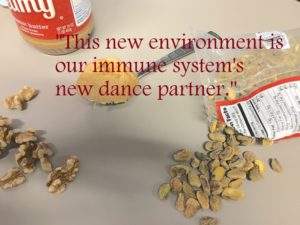Food Allergy Research: Asking the Tough Questions
 Written by Alice Hoyt, MD, UVA Allergy and Clinical Immunology Fellow
Written by Alice Hoyt, MD, UVA Allergy and Clinical Immunology Fellow
Food allergy is a strange disease. Foods are meant to nourish man, so why in the past 20 years has there been an increase in food allergies? That is the question I’m most commonly asked, and parents of children with food allergies often ask me if their child will outgrow it. Such loaded, tough questions… But that’s why many physicians and researchers are in this field: to ask – and hopefully answer – the tough questions (knowing, of course, that answering one question will lead to many more questions!)
One day during the first few months of my fellowship, one of my mentors asked me how I think vaccines affect food allergies. A card-carrying member of the American Academy of Pediatrics and an avid supporter of immunizations, I looked at my mentor and said, “There is no link.” His response, “What about alum?”
“Alum” is the name commonly used to refer to aluminum adjuvant found in many vaccines. An adjuvant is an ingredient that induces a robust immune response in our bodies, granting us protection against the targeted infection. Alum is also used to create allergic animal models, which are used in allergy research. Scientists do not know how alum creates these immune responses (but they are getting closer to answering that!) So the question becomes, “Does alum have allergy-inducing effects in humans?”
This question has taken root in some circles because children receive more doses of alum-containing immunizations today than ever before, accounting for the dramatic decreases in mortality from infectious diseases. But before any sort of relationship can be assumed, we must consider the other significant differences – primarily, improvements in hygiene – that a child’s immune system experiences in today’s world and exposures that the human immune system has not encountered until relatively recently in the history of man: clean water, processed foods, medications, genetically-modified organisms, bath/dish/laundry detergents, skincare products, more time indoors, and less time outside in the fresh air and dirt. We must also consider the lack of exposures in our hand-sanitizer-everywhere world. These advancements, many of which are life-saving and should be appreciated, are key players in the new environment-immune connection in the developed world.
To speak in a metaphor: this new environment is our immune system’s new dance partner, and scientists are exploring how this new dance partner has impacted our immunologic waltz. Our team is exploring one small part of that dance, and WE HAVE NO EVIDENCE TO SUPPORT THAT VACCINES CAUSE FOOD ALLERGY. But does that mean there is no effect, perhaps a beneficial one? Could some vaccines improve a child’s likelihood to outgrow a food allergy?
We live in a whole new world, so let’s explore it! Let’s do so responsibly and let’s get some answers for those parents who fear they will send their child to school but she won’t come home because of a peanut. We can change that scenario to a happy outcome, a world without allergies. And to do so, we need to keep asking the tough questions!
- Bridging the Gap: Understanding Gender Dynamics in Substance Use Disorders Among College Students
- I Feel Like a Speck
- Hello? How Scammers Use AI to Impersonate People and Steal Your Money
- UVA Club of Phoenix: Admitted Student Celebration
- UVA Club of Coastal Carolina: Jefferson Dinner & Wine Pairing
- UVA Club of Austin: Admitted Student Celebration
